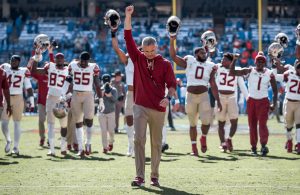- Sunday Seminole Summary: FSU Football Adds Pair of WR Transfers
- Sunday Seminole Summary: FSU Football Exits ESD With Top-15 Class
- Sunday Seminole Summary: FSU Soccer Tops BYU for Third National Championship
- Sunday Seminole Summary: FSU Soccer Advances to National Championship Match
- Seminole Sunday Summary: FSU Soccer Heads Back to College Cup
- Seminole Sunday Summary: FSU Soccer Reaches Sweet 16; Football Tops Boston College
- Seminole Sunday Summary: FSU Soccer Wins ACC, Advances to Second Round of NCAA Tournament; FSU Football Rallies Past Miami
- Seminole Sunday Summary: FSU Soccer Tops Wake on OT to Advance to ACC Final
- Seminole Sunday Summary: FSU Football Crushes UMass for Third Straight Win
- Seminole Sunday Summary: FSU Soccer Stays Perfect with Pair of Wins
Column: Thoughts on the Recent FSU Story in the New York Times
- By Clint Eiland
- Updated: September 2, 2017
 Ross Obley/FSU athletics
Ross Obley/FSU athleticsEarly Friday afternoon — one day before the Florida State football season is set to kick off — the New York Times released an article detailing the saga of an online hospitality course. According to Mike McIntire, multiple football players were shown favoritism in a 2013 online class. Examples of plagiarism are in the story, as well as claims of improperly extended deadlines.
This piece will be discussing the NYT article, so read the original to get the full context for the following remarks.
Perhaps the one positive out of this entire story is that the university was alerted what was going on in the class and addressed it outright. The administrator (Mark Bonn) is no longer at his former position and the program was revamped once it became clear that there were issues with plagiarism and cheating. Ever since a 2007 story where athletes were found to have cheated in an online music class, Florida State has been much more proactive in clamping down on potential academic problems.
That being said, it is still pretty ridiculous that some of the players felt that they didn’t need to put forth basic effort on their assignments. It’s one thing to have lackluster citations — that’s something that typically gets corrected in college classes once students start to write more. It’s another thing to blatantly copy and paste information and expect to not get caught. It’s arrogance and dishonesty.
Obviously, that is not contained to football players. But one hopes that it would be relayed to the team and there would be punishment for doing so, in addition to whatever academic punishment there would be.
The other part of the story focuses on deadlines and the apparent flexibility given to players. It cites the case of James Wilder Jr. and his tardy work.
“One issue was that students were not allowed to make up missed assignments without a documented excuse, such as a medical problem, approved by the university.”
Here’s what I’m going to add: while the university can say that, it is not strictly followed. Regular students and athletes alike are regularly given make-up opportunities for assignments that they have missed.
Could there be favoritism towards athletes that is the root of why they were given extra time? Maybe. But it’s difficult to make any hard conclusions from what has been given to us, considering that we already know the policy is not held in high regard by other professors.
Florida State responded with a statement Friday morning, saying that it hired an independent law firm to investigate the course in question. There were no NCAA violations found, but the course was still modified for other reasons.
That last bit is revealing. Clearly the law firm found something about the course that was raising red flags for the university. The FSU response, as alluded to earlier, was to cancel multiple classes in the program and have a new administrator. Something tells me that the problem wasn’t just football players, even if they are who we have concrete physical evidence for.
Many are wondering what can be done. By now? Nothing. The incidents occurred four years ago; none of the players involved are still at the school, the program was reviewed and changed, the former administrator is no longer in charge, and the subject of the story died in a tragic accident.
There was a problem at Florida State that the university was alerted about. The situation was examined and necessary changes were made. It’s certainly not the best look for the school, but at this point, there’s not much anyone can do besides demand more transparency in the future.
That can’t be stressed enough — if the school was more transparent about situations like these, it would be received by alumni more positively. Nobody wants to find out that their school has a program where cheating and plagiarism have become noticeable. But the next step to dealing with that is to be open about correcting it.
One thing the New York Times story makes clear is the influence that Bonn had in the Dedman School of Hospitality. It seems that at almost every turn, he was there trying to bend the rules and not take the job seriously. It was the right step to remove him from his position as the director of distance learning.
But quite frankly, after reading about everything he did in the saga, it’s a wonder why he has not been let go by the university. His actions unfairly de-legitimize the efforts of every graduate and current student of Florida State University. The players and other students who plagiarized certainly deserve their share of the blame. But as someone in a leadership position, Bonn needs to be the one to establish the standards of honesty. He clearly failed.
Now, all of that is something that is worth discussing. It gives some insight into Florida State’s response and how it was not happy with what could’ve turned into a major academic situation. If the New York Times had contained it to that, and focused on the issues with players, it’d be one thing.
But the publication couldn’t.
The NYT article follows Christina Suggs and her time at Florida State. It focuses on some of the issues she felt she was dealing with at the university and how she struggled with those above her (like the aforementioned administrator). It too provides some good insight in to how bureaucracy operates at large institutions and the pressures one can feel.
Where they go completely off the rails is near the end of the piece.
“As the 2013 fall semester came to a close and the Seminoles were preparing for the championship game, Ms. Suggs — who already had two master’s degrees — was informed that her job as a teaching assistant would not be renewed because she did not have enough business school credits. In an email to the inspector general, Ms. Suggs said that she believed she had lost her job “due to this unfortunate circumstance with Dr. Bonn and the investigation into the football players.â€
This Twitter thread helps us understand the implication of this part. The biggest issue is that Florida State literally cannot defend itself from that claim. It involves FERPA and the university cannot disclose whether or not she was actually short of the credits needed to maintain her teaching assistant status.
So as it stands, that segment serves to make one question the legitimacy of the university’s claim. But we will probably never know the full truth of whether or not that is what actually happened. Read the rest of theses tweets for some more context:
The insinuation by the NY Times that she lost her funding because of the athletics stuff is likely balderdash. 1/
— Jim Mogle (@FSUMogle) September 1, 2017
“In the months that followed, in deteriorating health and deeply in debt with student loans, Ms. Suggs struggled to cobble together a steady income from online teaching jobs. She had back surgery in October 2014 and returned to her tiny rented condo in Panama City Beach, Fla., to recuperate. Not long after, Ms. Suggs lay down for a nap while her mother took her son out to a restaurant. They returned to find her unresponsive, a trickle of blood seeping from her nose. The medical examiner determined that she had died accidentally from a toxic combination of prescription medicines for pain, anxiety and depression.”
I really don’t know why I’m forced to say this, but insinuating that her death was in part caused by her experience at FSU is a really terrible thing to do. It’s “linked” in the sense that it was a part of her life that occurred prior to her death.
But with how little information we are given surrounding her troubles with anxiety and depression, it is obvious what McIntire is attempting to portray. The title of the piece makes it fairly evident as well. Using someone’s tragic death to further your point against a school is simply disgusting. That’s all that needs to be said for that part.
Nobody is shocked that players get preferential treatment. Most of the time that preferential treatment is simply afforded to them through legitimate means of tutors or altered schedules. Yes, almost every school does it in some way, shape or form.
There are classes at almost every school that are considered easy A’s where regular students and athletes alike don’t have to use much brainpower, and where professors are very lax about deadlines. When it begins to impede on the legitimacy of an institution is when it becomes really troublesome.
A lot of fans are upset that the New York Times is still focusing on Florida State. It has now been four straight years of negative articles, each with varying levels of honesty. There are very few fans who would claim the university is perfect.
Most would tell you that there is a concerning divide between athletics and academics — again, not contained to Florida State in the slightest. Truthfully, the divide will only get bigger as the revenue from college sports continues to increase.
The problem is one of intentions. As I alluded to earlier, if the article had stuck to the information prior to that of Suggs being fired, it would be practically flawless. Because before that, it largely contained nothing but relevant pieces.
Yet when it starts to imply (with scant evidence) that someone was let go for speaking up, and that this same person died in part because of her time at FSU, it makes one wonder if it actually seeks to improve the issue. Does McIntire actually see her death as a result of the class? Or does he just want to use her death as a nice kicker for his book?
At the end of the day, little can be done now. Florida State seems to have done a decent job at correcting the course and its standards. There are still a few things we should want changed. We should know if Bonn was punished and why he still has a job at the university (no, fundraising is not a legitimate reason for keeping him). We should also know what the outside consultant found. Basically, we should have all the information we are allowed to have.
For all that its worth, the article should not be thrown out, even if it does make wildly inappropriate insinuations at the end. There’s still something we can learn from it. It’s just frustrating that we have to cut through the conjecture to get to it.




You must be logged in to post a comment Login